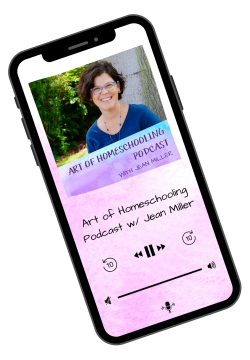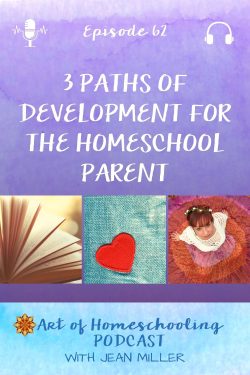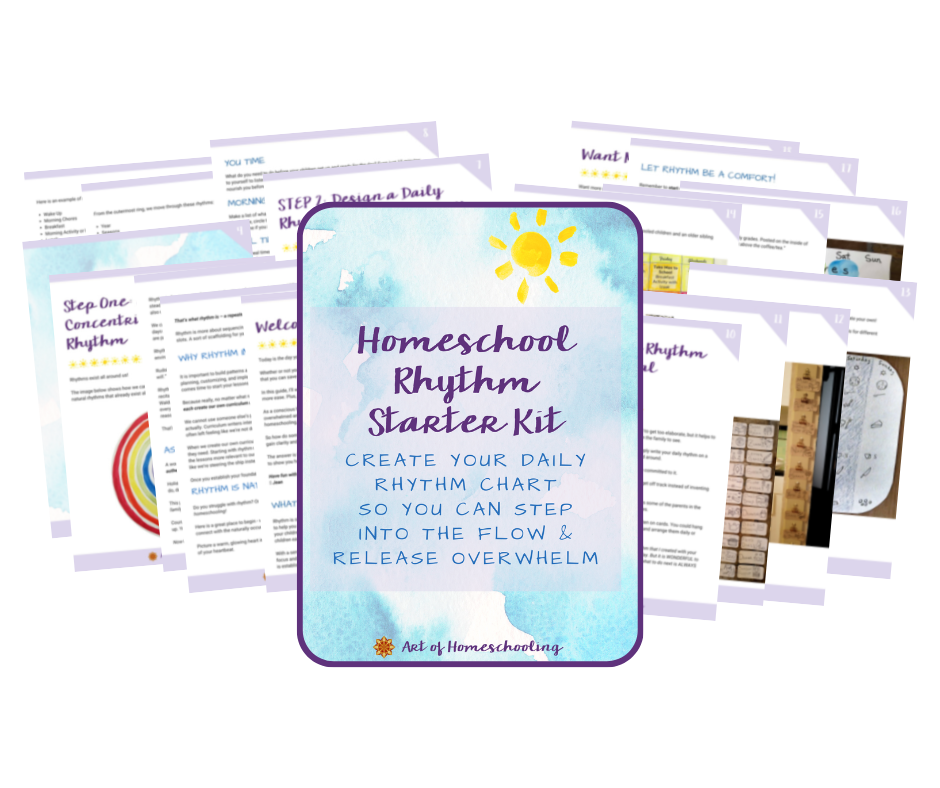Episode 62
Homeschooling is not just all about the kids all the time. We as homeschooling parents are on a journey as well. Let’s explore 3 paths of development for the homeschool parent!
These three recommended paths come from my experience homeschooling my own three children as well as from mentoring hundreds of homeschooling parents around the world.
So how exactly do we grow and develop as homeschool parents?
I would say that parenting, especially parenting and homeschooling, is the most intense path of personal growth that there is!
In additional to learning how to teach, our children challenge us to really see ourselves and to grow as human beings.
So as we dive into these 3 paths of development for the homeschool parent, I want to remind you to be gentle with yourself and to notice any tendencies of perfectionism or comparison you might have.
You do not need to be “perfect.” Truth is, there’s no such things as a perfect parent!
Rather, I encourage you to stay present and to be the best you can be in any given moment.
Ready now for that eye-opening and expansive growth? Let’s go!
How do we grow and develop as homeschool parents?
3 Paths of Development for the Homeschool Parent
- Books
- Community
- Surprise! It’s YOU! You, yourself!
Let’s explore these 3 paths of development for the homeschool parent.
#1: Books
I love, love, LOVE reading! And there is so much wisdom in parenting and homeschooling books.
But a word of caution here. As you read and explore, take what serves you and leave the rest.
Sometimes when we read about parenting and homeschooling, we are left feeling that there is only one right way to do things. Or that we’re doing everything all wrong.
We can end up judging ourselves so harshly and feeling bad about ourselves. And this can really undermine our confidence and effectiveness as parents and homeschoolers. Does this sound familiar at all?
Because we cannot change from a place of shame, my advice to you is to pick and choose wisely what you will take in. Find books that inspire you and that call on you to be better as a person and as a parent.
The first book that I ever read that made me feel better as a parent rather than worse was Simplicity Parenting by Kim John Payne.
I share more parenting and homeschooling resource books here on Episode #42 of my podcast, My Favorite Books for Homeschooling.
And on my website here, Just Starting with Homeschooling?
#2: Community
It is so important to find a community of like-minded homeschoolers, parents, or friends to offer support.
Many of us have families of origin who don’t really understand why we’re making the choices we’re making. Choices to live and raise children holistically, to spend time outdoors rather than on screens, to preserve the magic of childhood, and to live simpler lives.
Sometimes these well-meaning loved ones can be downright critical of our choices. So please remember: it doesn’t matter what they think!
We get to make the decisions about the atmosphere we create for our children and our family.
The support of a few like-minded parents or families can make all the difference to help us stay the course with confidence and to enjoy the journey.
This is why I host the Inspired at Home community for holistic homeschoolers. This is a membership for community and conversation with fellow homeschoolers, along with coaching and classes, too. It might be just the community you’re looking for to support your development as a homeschooling parent.
#3: Yourself
This may surprise you! Yes, YOU can be a source of development on your parenting and homeschool journey!
By befriending yourself and getting to know yourself deeper, you can find eye-opening and expansive growth.
There are so many tools available to use these days. From the Enneagram to the four temperaments.
It starts with self-compassion and curiosity. Because curiosity can displace harsh judgment. And I know we’re often our own worst critics.
Here are two fun and inciteful places to start exploring:
- The Question of the Temperaments is an article over in the Waldorf Online Library. We all tend toward one or two temperaments, and each stage of life has a quality of one of the temperaments. But the goal though is a balance of all four. It’s a short and inspiring article, so go check it out!
- Secondly, I love this quiz from Gretchen Rubin based on her idea of the Four Tendencies. The tendencies relate to how we respond to the world and specifically to expectations and motivation. So interesting!
We want to become keen observers of ourselves! That’s right, Get to know yourself. And then if you find you want to make any changes in how you parent, communicate with loved ones, or even homeschool, you can do that from a place of self-compassion one small step at a time.
If this is something that’s calling to you, making small changes from a place of self-compassion, keep an eye out for more details about a new 5-day experience I’m hosting in early January.
I’ll leave you with this poignant quote from Rudolf Steiner:
“You will not be good teachers if you focus only on what you do and not upon who you are.”
And there you have it then, 3 paths of development for the homeschool parent: books, community, and YOU!?
Rate & Review the Podcast
If the Art of Homeschooling Podcast has inspired you, I’d LOVE it if you could rate and review the podcast on your favorite podcast player! Reviews can be left on Apple Podcasts (iTunes), Podcast Addict, or Stitcher.
Or simply pop on over to lovethepodcast.com/artofhomeschooling and choose where you want to leave your review.
And if you want to show your appreciation for the Art of Homeschooling Podcast, you can buy me a coffee!
Never Miss an Episode!
 Listen & Follow:
Listen & Follow:
Check Out All the Episode Here (<<<Click that link!)
Save or share this encouragement on Pinterest with the image below.



